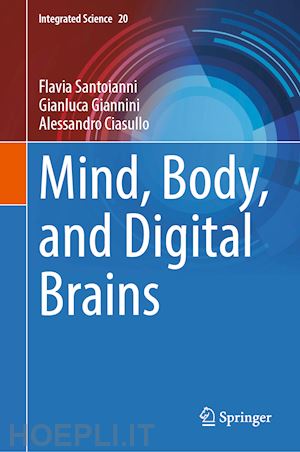
Questo prodotto usufruisce delle SPEDIZIONI GRATIS
selezionando l'opzione Corriere Veloce in fase di ordine.
Pagabile anche con Carta della cultura giovani e del merito, 18App Bonus Cultura e Carta del Docente
This book—Mind, Body, and Digital Brains—focuses on both theoretical and empirical issues and joins contributions from different disciplines, concepts, and sensibilities, bringing together scholars from fields that at first glance may appear different—Neuroscience and Cognitive Neuroscience; Robotics, Computer Science, Deep Learning, and Information Processing Systems; Education, Philosophy, Law, and Psychology. All these research fields are held together by the very object to be discussed: a broad, articulate, and polyphonic reflection on the status of theories and fields of application of Digital Technologies and Artificial Intelligence, seen from the perspective of the digital mind, digital body, and digital brain. Scientific and humanistic issues will be considered through an interdisciplinary point of view, with the purpose of deepening emerging trends about various disciplines.
This book offers a framework for different perspectives and, at the same time, a platform for discussion aimed not only at experts, but also at a non-specialist public interested in the digital revolution. The digital revolution is emerging from the intertwining of ethical, philosophical, and technological aspects, which concern several general issues as cooperation, law, and environment, but also specialized as cybersecurity or algorithmic citizenship. More questions arise, concerning which opportunities and risks are associated with the new scenarios, what idea of humanity is emerging from the increasingly widespread use of Artificial Intelligence technologies, and what idea of integrated science should we promote to accompany the ongoing transformations.
Part I DIGITAL HUMANISM.- Technologies, Artificial Intelligence, and Sapiens.- Sapiens’ Future in the Age of Artificial World Picture.- Biomimetic Learning Design in the Artificial Era.- Robots and Humans.- Exploring the Current State and Future Potential of Generative Artificial Intelligence using a Generative Artificial Intelligence.- Part II DIGITAL MIND.- Self-Identity, Self-Regulated Learning, and Intelligent Adaptive Systems.- Supporting Learners’ Metacognition and Meta-affect.- Understanding Consciousness in the Age of AI and XR: Altered States, Emerging Realities, and the Digital Self.- Learner Modeling Interpretability and Explainability in Intelligent Adaptive Systems.- Deep Learning in Educational Scenario.- Augmented Reality in Higher Education.- An Exploratory Study on the Beliefs of Medical Students.- Part III DIGITAL BODY AND DIGITAL BRAINS.- Brain-Computer Interactions, Neuroergonomics, and Psychomotor Learning.- Brain-Computer Interaction and Neuroergonomics.- Non-Invasive Modulation of Brain Activity during Human-Machine Interactions.- Environmental Enrichment in Real and Virtual Realms Fosters Neural Plasticity Related to Learning and Memory Processes.- AI-Powered Psychomotor Learning through Basketball Practice: Opportunities and Challenges.- The Intelligence of the Hands.- Part IV DIGITAL REVOLUTION.- Ethical, Philosophical, and Technological Cooperation.- Cyber Warfare and Ethical Frontiers: Elevating Conflict to the Digital Frontline of Global Struggles.- Cooperation, Law, and Artificial Intelligence Technologies.- Algorithmic Citizenship: Fostering Democracy, Inclusion and Explainability in the Era of Artificial Intelligence.- Life-on-life: Humanism facing the Challenges of Artificial Intelligence.
Flavia Santoianni is Full Professor of Education at University of Naples Federico II, Department of Humanities and Director of the Brain Education Cognition Area of RTH Lab. She teaches in the Philosophy Degree Course. She is Director of the gold open access journal RTH Research Trends in Humanities; she has published 28 books and several national and international articles. Her books are translated into English and Spanish. She is Author of the Theory of Basic Logic, and her research interests concern bio-educational sciences; mind, body, brain, and education; teaching and learning; learning environments design; spatial, digital, and immersive education; and implicit learning. She is already Editor of the Springer's volume The Concept of Time in Early Twentieth-Century Philosophy, 2016.
Gianluca Giannini is Full Professor of Moral Philosophy at the Department of Humanistic Studies, University Federico II of Naples. For the past three years he has been Coordinator of the Three-Year Course in Philosophy at the Department of Humanistic Studies of the University Federico II of Naples and Member of the Council of the School of Humanities and Social Sciences of the University Federico II of Naples. he is Scientific Officer and Coordinator of the University Task Force "Human&Future" of the University Federico II of Naples, an innovative structure that gathers more than three hundred members among national professors and scholars on the decisive issues of our time: from the digital transition to the ecological transition.
Alessandro Ciasullo is Researcher of Education at the University of Naples Federico II. Ph.D. in Education and Knowledge Management, he has authored several national and international works. His research interests are artificial intelligence, teaching and learning, specific disorder learning, music education, and bio-educational sciences.











Il sito utilizza cookie ed altri strumenti di tracciamento che raccolgono informazioni dal dispositivo dell’utente. Oltre ai cookie tecnici ed analitici aggregati, strettamente necessari per il funzionamento di questo sito web, previo consenso dell’utente possono essere installati cookie di profilazione e marketing e cookie dei social media. Cliccando su “Accetto tutti i cookie” saranno attivate tutte le categorie di cookie. Per accettare solo deterninate categorie di cookie, cliccare invece su “Impostazioni cookie”. Chiudendo il banner o continuando a navigare saranno installati solo cookie tecnici. Per maggiori dettagli, consultare la Cookie Policy.